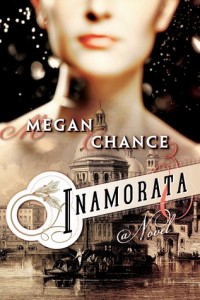 Format read: ebook provided by NetGalley
Format read: ebook provided by NetGalleyFormats available: ebook, paperback, audiobook
Genre: historical fiction; fantasy
Length: 421 pages
Publisher: Lake Union Publishing
Date Released: August 1, 2014
Purchasing Info: Author’s Website, Publisher’s Website, Goodreads, Amazon, Barnes & Noble, Book Depository
American artist Joseph Hannigan and his alluring sister, Sophie, have arrived in enchanting nineteenth-century Venice with a single-minded goal. The twins, who have fled scandal in New York, are determined to break into Venice’s expatriate set and find a wealthy patron to support Joseph’s work.
But the enigmatic Hannigans are not the only ones with a secret agenda. Joseph’s talent soon attracts the attention of the magnificent Odilé Leon, a celebrated courtesan and muse who has inspired many artists to greatness. But her inspiration comes with a devastatingly steep price.
As Joseph falls under the courtesan’s spell, Sophie joins forces with Nicholas Dane, the one man who knows Odilé’s dark secret, and her sworn enemy. When the seductive muse offers Joseph the path to eternal fame, the twins must decide who to believe—and just how much they are willing to sacrifice for fame.
My Review:
There is a hunger that lurks in the shadows, waiting impatiently to feast on its right and proper prey.
The hunger is monstrous, but is not necessarily evil. It bargains with its victims, and once struck, the bargain is fulfilled to the letter.
In return for providing an already talented artist with the inspiration and the vision to create on masterwork of towering genius, the muse takes, in return, everything that made the artist who he was.
The death that usually follows is not the monster’s fault. The bargain is kept.
There are a number of artistic geniuses, in art, in letters, in music, who produced one final towering masterpiece, and then died or faded. Keats, Byron, Schumann, Vivaldi, Canaletto, Shelley. Great artists who burned out young, whether they died or not.
What if their great inspirations came from a single source, despite the differences in time and place? What if John Keats’ Lamia was all too real?
The beautiful decay of 19th century Venice is the perfect backdrop for this story of love, corruption and inspiration.
Odile Leon has sold her soul for a chance to be remembered. Quite literally sold her soul. Once every three years, she must find an artistic genius, sung or unsung, and make him a legend. In return for artistic immortality, that artist must sell his own soul to her as his muse.
In Venice, Odile is brought to bay by one man she toyed with but did not consume, and an artist who has already found his muse, in the person of his twin sister.
Nicholas Dane is obsessed with stopping Odile, in the hopes that she will return his poetic talent. Joseph and Sophie Hannigan are bent on outrunning the salacious rumors that follow them, and finding the perfect showcase for Joseph’s magnificent artistic talent.
Odile needs a victim, before it is too late. But her long life has not prepared her to face that it is already too late, not just for her, but for all of those she has drawn into her web.
Escape Rating B: So much of this story operates in the shadows, and those shadows give it its sense of creeping horror and dark need.
In atmosphere, it reminds me a bit of Lauren Owen’s The Quick (reviewed here), but the motivations behind the monstrousness are different. In The Quick, the society only wants to make vampires out of the “right sort” of people, and others are pawns, toys or food. Their complete sort of self-centeredness feels evil on multiple levels.
Although both stories are set in the same era, the monstrousness of Odile is not necessarily evil. Many artists of all types would think their lives were a reasonable trade for otherworldly inspiration and artistic immortality. She offers a bargain, and she keeps it. Admittedly, her victims are often too much in her thrall to refuse.
Odile is a succubus, but a very particular one. She maintains her life by sucking out their talent. In return they live forever, or at least achieve immortal renown.
Nicholas Dane hounds her from city to city, believing that if he prevents her feeding, she will be destroyed. He is both right and wrong, in a way that he pays for dearly. Because Odile fixes her sights on the twin brother of the woman he loves.
And Sophie can’t live without her brother, or vice versa.
The relationship between Sophie and her brother Joseph both fascinates and repels everyone they meet, including Odile and Nicholas. We’re never 100% certain, but readers are intended to find more than a hint of V.C. Andrews’ Flowers in the Attic in the Hannigans’ backstory.
It’s obvious that they mean too much to each other, but nothing is ever confirmed. That background becomes part of the rotting decadence of Venice.
The story starts out slowly, and switches between multiple points of view with every chapter. But we still only explore each party’s surface thoughts, and not the secrets they keep from themselves as well as each other.
This story gets darker and darker as it leads to its conclusion. It haunts, and makes you want to brush off lingering traces of the web, both at the same time. The story is definitely a case of atmosphere over action, but I couldn’t go to sleep without finishing it. And had a difficult time sleeping afterwards.
~~~~~~GIVEAWAY~~~~~~
Megan is giving away a paperback copy of Inamorata to one lucky winner (US/Canada)! To enter, use the Rafflecopter below.

